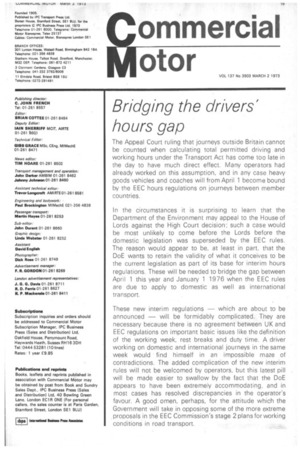Bridging the drivers hours gap
Page 21

If you've noticed an error in this article please click here to report it so we can fix it.
The Appeal Court ruling that journeys outside Britain cannot be counted when calculating total permitted driving and working hours under the Transport Act has come too late in the day to have much direct effect. Many operators had already worked on this assumption, and in any case heavy goods vehicles and coaches will from April 1 become bound by the EEC hours regulations on journeys between member countries.
In the circumstances it is surprising to learn that the Department of the Environment may appeal to the House of Lords against the High Court decision: such a case would be most unlikely to come before the Lords before the domestic legislation was superseded by the EEC rules. The reason would appear to be, at least in part, that the DoE wants to retain the validity of what it conceives to be the current legislation as part of its base for interim hours regulations. These will be needed to bridge the gap between April 1 this year and January 1 1976 when the EEC rules are due to apply to domestic as well as international transport.
These new interim regulations which are about to be announced — will, be formidably complicated. They are necessary because there is no agreement between UK and EEC regulations on important basic issues like the definition of the working week, rest breaks and duty time. A driver working on domestic and international journeys in the same week would • find himself in an impossible maze of contradictions. The added complication of the new interim rules will not be welcomed by operators, but this latest pill will be made easier to swallow by the fact that the DoE appears to have been extremely accommodating, and in most cases has resolved discrepancies in the operator's favour. A good omen, perhaps, for the attitude which the Government will take in opposing some of the more extreme proposals in the EEC Commission's stage 2 plans for working conditions in road transport.




































































































